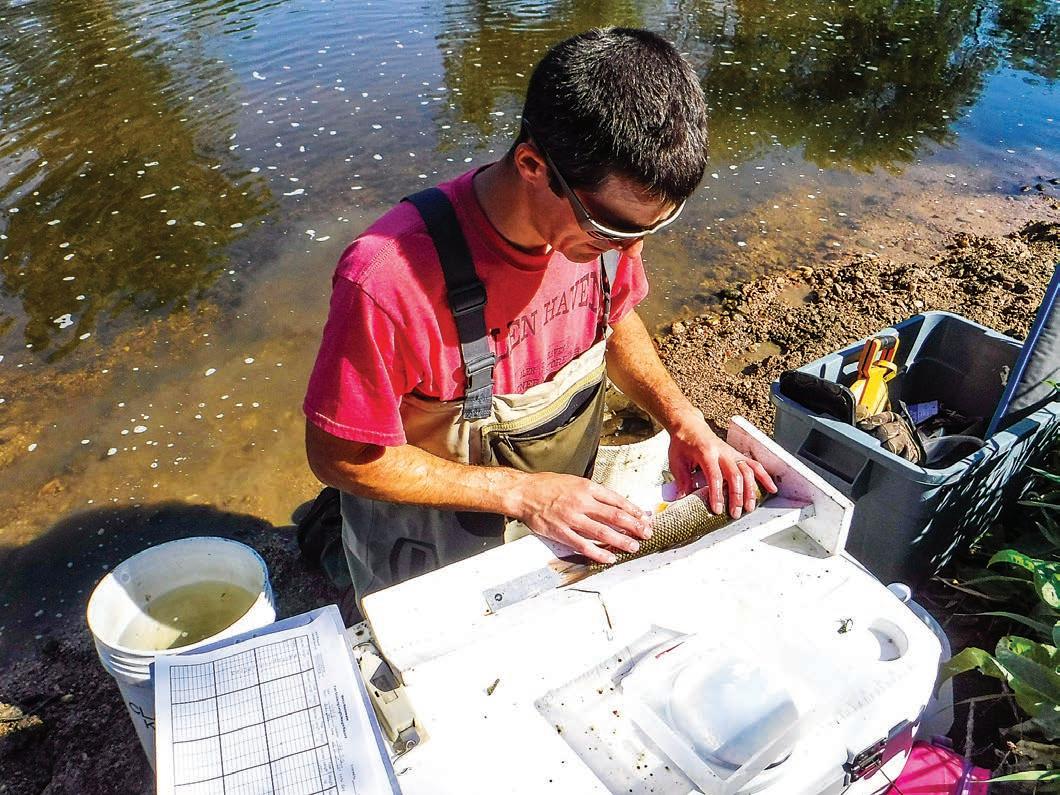
2 minute read
RIVER
macroinvertebrates, including sensitive species, this indicates good water quality. Dissolved oxygen is just one important aspect of overall water quality,” Harman said.
Harman said these macroinvertebrates tell them what they do and a lot about water quality. If certain kinds of bugs are present, the water quality can sustain these macroinvertebrates, and they’re also an essential part of the food chain for the sh that consume these bugs.
“We amended that agreement and since then we built four di erent drop structure locations along the river to improve habitat and will select a fth spot to construct by fall. en when complete, we will go into phase six and continue ongoing monitoring of aquatic life forever at all these locations,” Dorsch said.
Dorsch said to improve the water quality, stirring it and building miniature waterfalls to put the oxygen back in the river over time, so it starts to get better. In addition, they will place large rocks that will provide protective cover for sh, create pools close to the bank of the fast-moving water—trees will be plants and shrubs for aquatic shade and creates a riparian zone, which is a vegetation area between land and river.
e Metro Water Recovery scientists will stock the river with Colorado native species, primarily minnows, they said.
“ ey are not very big, but we love our native species and want to protect them every chance we can,” Dorsch said. “We also target Johnny Darters and Iowa Darter which are the most sensitive species of minnows in the South Platte River.”
While Metro is working on the Platte River project, Dorsch said shing will still be allowed even when constructing ri es which are fast-moving sections of stream and other habitat improvements farther down the river. e scientist will continue to monitor the water quality daily and how much sediment is released during construction e orts.
“We don’t want that sediment going downstream and impacting aquatic life. My sta and I are out here every day checking on what’s going on and what’s gone wrong. If there are problems, we will correct it,” Dorsch. e Metro Water Recovery scientists’ work didn’t go unnoticed in saving the aquatic life on the river — they received the National Environmental Achievement Award from the National Associations of Clean Water Agencies (NACWA) for the South Platte River Aquatic Life asked his coach if it was OK to talk. e third year, he was all ears -- and more smiles -- and needed no introduction or permissions. Guerrero also won three straight state titles; his son was on the Fort Lupton football team this past fall. (Someone in this paragraph is clearly old). e kids who tried new sports, new ventures in their post-school lives. e same applies to former coworkers, friends who passed through life for a short amount of time, yet stay in touch and are doing good things in their chosen professions. e athletes who called me “Mr. Smith,” even though the real Mr. Smith (my father) died in 2013. Attempts to take on the name “Old
Mikhail Sands, born without use of one hand, yet still wrestled, played football, rugby, was a state decathlon champ and ran track at Prairie View High School.
Anyone who signed a college letter of intent to continue their athletic endeavors somewhere.
To watch them grow as young men and women, to see them gain condence they didn’t know they had and become contributing members of society leads to a lot of smiles.
Habitat Improvements Projects, according to a news release. is fall, the honorees will be recognized at the NACWA’s winter conference in Sonoma, CA.






“We love getting awards, (but) like most biologists — we come in do our job,” Dorsch said.
“It’s nice to get the award,” Harman added. “People aren’t aware of the work we do, so it’s kind of nice to get some recognition and people realize we’re out here in the river.”









